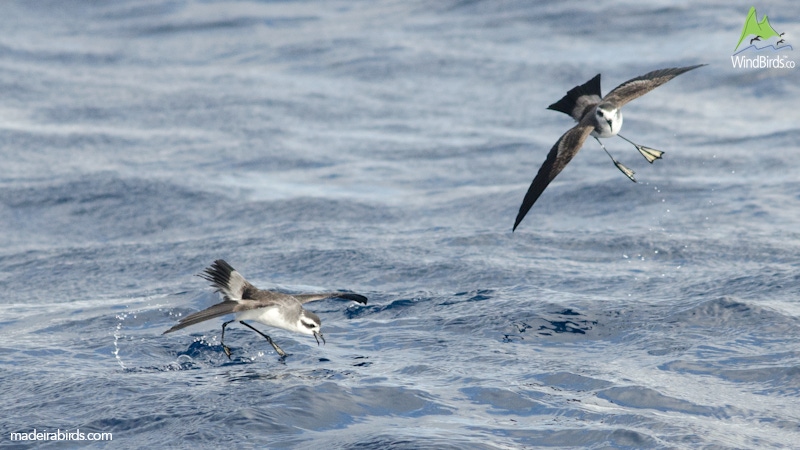White-faced Storm Petrel Pelagodroma marina hypoleuca (Webb, Berth. & Mouq. Tandon, 1841)
Order: Procellariiformes Family: Hydrobatidae Status: Breeding in Madeira
Recommended birdwatching sea trips to watch this seabird
Zino’s Petrel Pelagic Expedition

White-faced Storm Petrel Field ID Keys
Shape & Size
Small seabird, although considered medium sized for a storm-petrel, with long legs that project feet well beyond the tail and broad, paddle shaped wings.
Colour Pattern
The White-faced petrel undersides are white with dark outlined underwings. The bird’s face is also light coloured with a dark mask through the eyes. Its upper-parts are dark grey with a lighter ‘U’ shaped rump.

Behavior
Its peculiar flight in which it appears to “bounce” from side to side over the sea surface with the wings open is a good key to identify this seabird. It is normally seen alone near Madeira though near its breeding colony in Selvagens islands it groups in small flocks.
Habitat
The North Atlantic White-faced Storm Petrel is a pelagic bird with the sub-species Pelagodroma marina hypoleuca breeding in the Madeira and Canary archipelagos while in Cape Verde occurs the subspecies P. marina eadesi. In Madeira archipelago the bird nests only on the Selvagens islands where it can be easily seen at sea, close to shore between February and the first week of August. Around Madeira it is sometimes attracted to chum on offshore birdwatching trips.

Distinction from similar species
There are no similar storm petrel species in the North Atlantic with so much white on it.
Pelagodroma marina hypoleuca Biometrics
Wingspan: 420 - 430 mm (Flood & Ashley, 2011)
Total length: 180 - 210 mm (Flood & Ashley, 2011)
Weight: 40 - 60 g (Flood & Ashley, 2011)

Other Bird Facts
Seasonality in Madeira: Sometimes observed in pelagic expeditions around Madeira between April and the end of July.
Breeding: Both parents excavate the deep nest in sandy ground. On the Selvagens islands, the nests are protected by two types of plant of the species Mesembryanthenum cristallinum and Mesembryanthenum nodiflorum. The roots of these plants hold up the nest tunnel accesses. A single egg is laid at the end of March and the chick hatches in May. Eight to ten weeks later the young bird is already flying.
Diet:
It feeds mainly on planktonic crustaceans and small fish, but it will also feed on some squid (Birdlife International, 2013)
Status
Madeira local status by Correia-Fagundes et al, 2021: Common breeding bird (in Selvagens)
Madeira local status by Romano et al, 2010: Common breeding bird (in Selvagens)
Madeira local status by Zino et al, 1995: Very common breeding bird (in Selvagens)
Conservation status by the IUCN Red List Categories, 2013: Least Concern ver 3.1

Name of this species in other languages
Portuguese: Calcamar, Painho-de-ventre-branco
German: Weißgesicht-Sturmschwalbe
Dutch: Bont Stormvogeltje
Swedish: Fregattstormsvala
Danish: Fregatstormsvale
Finish: Ulappakeiju
Norwegian: Fregattstormsvale
Spanish: Paíño Pechialbo
French: Océanite frégate
Italian: Uccello delle tempeste fregata
Polish: Oceannik bialobrewy
Slovak: Búrkozvest morský
Czech: Buřňáček běločelý
English synonyms: Jesus bird, Frigate Petrel